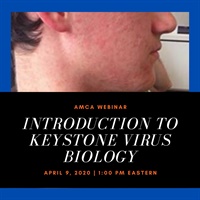Introduction to Keystone Virus Biology
- Average Rating:
- 1
- Categories:
- Webinar Archive
- Faculty:
- John Lednicky, BS, MS, PhD
- Course Levels:
- All Levels
- Duration:
- 1 Hour Session
- Format:
- Audio and Video
- License:
- Never Expires.
Description
We recently reported finding Keystone virus (KEYV) in a teenager with fever and a diffuse skin rash. The virus is considered a neglected virus; there has been very little new information about KEYV that has been generated since the 1960s. Preliminary studies performed at the University of Florida in year 2019 indicate that residents of North Central Florida have antibodies that recognize KEYV. We have now initiated a study along with collaborators from the Anastasia Mosquito Control District to gain insights on the occurrence and distribution of the virus in mosquitoes trapped at selected sites in Northern Florida. These studies reveal that the virus is still in circulation in certain populations of Aedes atlanticus mosquitoes. Nucleotide sequence analyses of the first virus isolates are in-progress and already reveal additional surprises.
Outline of talk:
- Discovery of Keystone virus in a patient
- Background information: Keystone virus
- Gaps in our knowledge of Keystone virus
- Studies to expand knowledge about the natural biology of Keystone virus: What are its hosts, and what is its geographical range?
- Up-to-date findings
AMCA Members - This archived webinar along with all AMCA webinars is available free to our active members. We are currently syncing this new system with our database to have seamless identification of our members, but until that is finalized you can access all webinars (live and archived) for free using our membership code which can be found in our member portal here.
Faculty
John Lednicky, BS, MS, PhD Related Seminars and Products
College of Public Health and Health Professions, University of Florida - Gainesville
Environmental and Global Health
John Lednicky has BS, MS, and PhD degrees in microbiology. After graduation with a BS degree, he worked as a clinical microbiology technician and attained two professional certifications: M(ASCP) and RM(NRCM). For both certifications, his specialty areas were in bacteriology and mycology. He worked with Staphylococcus aureus for his MS degree. For his PhD work he studied transcription regulation by transcription factor SP1 in a macaque polyomavirus (SV40) model.
Prior to joining the University of Florida, Dr. Lednicky was an assistant professor of pathology at the Loyola Medical Center in Illinois. He then worked in industry, where he engaged in biodefense-related work, aerobiology related to inhalation exposure studies in small animal models, various projects with avian influenza H5N1 and other influenza viruses, and the production of biodiesel from alga.
Dr. Lednicky’s current research focus areas at UF are: (a) aerovirology, (b) virus discovery, (c) virus surveillance with emphasis on arthropod-borne viruses, and (d) influenza virus studies. His laboratory discovered Rhinovirus C-51 and a unique variant of Human polyomavirus 9, and was the first to detect Zika and Mayaro viruses in Haitians. More recently, his laboratory was the first in the world to discover Madariaga and Keystone viruses in humans. His laboratory is also involved with the isolation of viruses that are causing lethal infections in farmed deer of Florida.
